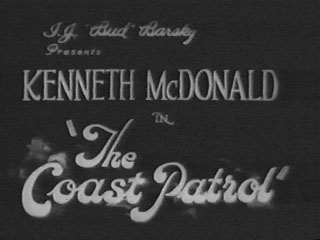
The Coast Patrol
Review by Steven Hill
NOTE: This review contains plot spoilers.
To skip potential spoilers, read BLACK text and skip GRAY text.
Most movies were a lot different back in the silent era. These days everything must move very quickly; even a "slow-moving" film like The Sixth Sense actually does get a lot done in its 107 minutes. The Coast Patrol has a running time of only 76 minutes, but what we see for the film's length could be covered in a 25-minute short by today's standards. Scenes which drag on interminably could be covered rapidly for a modern audience, and of course we wouldn't have to read intertitle cards that are on the screen long enough to memorise, either. But that's not true of all silent films, certainly movies such as The Battleship Potemkin or Sunrise hold up extremely well in this age of Michael Bay films. One can only presume that it's the low-budget melodramas such as The Coast Patrol that "stretch" themselves out in this manner.
Fay Wray's feature film debut came here at age 17 under the direction of Bud Barsky. She
portrays Beth, "a waif from the seas" adopted by the old lighthouse keeper who is quite
melodramatically overprotective of her (and a bit too visibly fond of her not to wonder
if he doesn't harbor some unclean thoughts about her). Beth is the coastal village tomboy
in the same way that a coastal village such as that portrayed here would have the town
drunk, the town clown, the crusty old salt, et al. She prefers to spend her days playing,
laughing and running, but finds her sheltered childhood disappearing quickly when she rows
out to sea to rescue a drowning woman. Our hero Dale Ripley (Kenneth McDonald) of the Coast
Patrol happens to be flying above the woman as she waterskis and falls, so he shows us just
how heroic he is by leaping from the biplane into the sea. The whole sequence is actually shot
quite nicely, with a lot of aerial takes of the sort that would commonly be done decades later with
bluescreen. Ripley rescues the woman Valerie just as Beth rows up to them; the three of them return
to the shore in Beth's boat.
Now Beth has had a taste of fame, and a taste of culture, for Valerie is actually partner
to Marmont, local smuggler always looking for a way to make things easier for his profession.
Marmont poses as a "titled foreigner" and is eager to make the acquaintance of Beth's adoptive
father because he's got a nice big boat the smuggler wants to rent. Marmont also takes advantage
of Beth's infatuation by convincing her that he wants her to run away with him. One evening Beth's father
discovers her wearing a ring, and he goes bonkers, threatening to kill the man who gave it to her.
This is a man who's going to have to come to terms with Beth's impending adulthood pretty
darn quick! Dale Ripley soon has the smuggling plot uncovered and we get a nicely filmed boat
chase along with a fire that claims most of the village before the End title card.
Fay Wray's Beth is visibly inhabited by a tomboy spirit, and she plays the lightweight part well. Her scenes with her adoptive father are perhaps her most dramatic, but she is completely overshadowed by Spottiswoode Aitken's overacting. One could say she underplays the part, especially considering that silent films purposely indulge in theatrical acting, but she might just be keeping herself low-key for her first movie. Kenneth McDonald as Ripley isn't a very engaging lead, unfortunately. His scenes only come alive when the cinematography does it for him. Gino Corrado as Marmont and Claire de Lorez as Valerie are a good matched pair of scheming high society ingrates, but for a professional smuggler Marmont seems fairly inept. Bud Barsky's direction is fairly straightforward with the exception of the visually exciting flying sequences, and the boat chase climax.
shill's Rating: 5 out of 10.